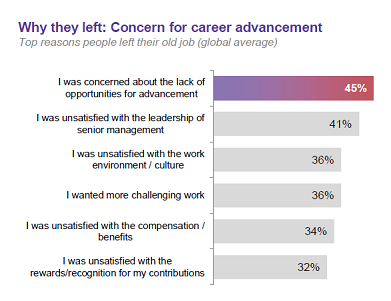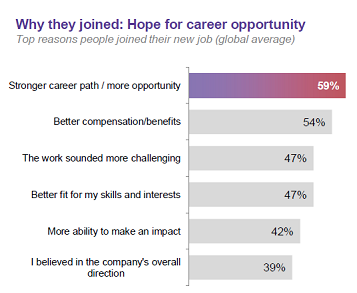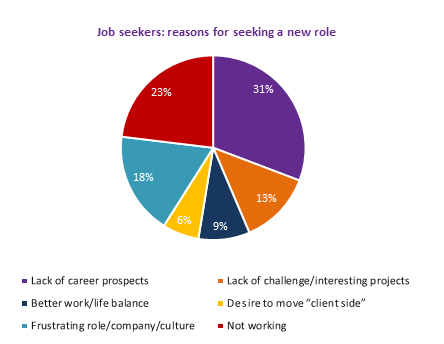Indeed and LinkedIn, the recruitment giants, have both recently produced major surveys addressing candidate attraction which, by implication, could also act as a blueprint for retaining staff.
Indeed reported that 75% of people surveyed in the Harris Poll are “actively looking or open to a new job” and that 63% “look at job opportunities” monthly. The main motivator for leaving was “dissatisfaction with current job” (not exactly a revelation perhaps) while primary attractions to a candidate were good pay and good location. It should be mentioned that while this appears to be a valid statistical sample of candidates (not just Indeed users) there was no information on the make-up of the sample which presumably was a cross section of the entire workforce including unskilled labour.
LinkedIn noted the rise of the “warm passive” job seeker which, when combined with active job seekers, suggested that at any one time 87% of people could be receptive to a job move! Career opportunity was given as the main driver. LinkedIn’s survey methodology relied upon their sample of users (presumably more likely to be “professionals” than the Indeed survey) responding to emails.


Source: LinkedIn survey, Why & How People Change Jobs, (Mar 2015). Shows global average. “Which of the following contributed to your decision to leave your previous employer?” and “Which of the following contributed to your decision to accept the job at your current company?”
Both surveys noted that while pay and benefits were rarely the main driver for a move they were certainly a key factor in the decision to accept a new role. While these are undoubtedly useful surveys, management consultants are a unique breed so it’s far from clear how relevant the conclusions are to this profession!
Prism Executive Recruitment therefore canvassed 92 current job seekers, all career management consultants, and 22 management consultancy employers for their experiences.

Source: Candidates registered with Prism Executive Recruitment Oct 2015.
Overwhelmingly “lack of career prospects” was cited as the main reason by both job seekers and employers. Amongst candidates this was often allied to other factors: for those in IT companies for example the “non-core” nature and “low priority” of management consultancy was often a factor.
Management consultancy employers cited “work life balance” as an equally important factor in a job move, perhaps reflecting their perspective of departing employees moving client side, which also featured as an important reason. Work/life balance was certainly mentioned by consultants on many occasions but rarely as a primary motive. The move client side was also cited by job seekers and ascribed to a “desire to have more accountability for work” as well as reduced travel.
Amongst the candidate population a significant factor, not mentioned at all by employers, was the very basic one of needing a job! Whether because of redundancy, personal reasons, contracts drying up, many consultants seeking a job were not working.Candidates also cited lack of challenge/lack of interesting work as a key driver, also often linked to the dominance of technology led assignments. As an employer more formally put it “the operating model doesn’t support them i.e. they can’t do the consulting work they want to do”.
Money was scarcely ever mentioned as a reason for moving, although it was more frequently cited as an important influencing factor in consideration of a new opportunity. Finally another key concern for candidates was a somewhat amorphous one of frustration with the employer, role or company culture. A frequent comment related to changes in company direction and strategy.
So what can employers of management consultants do?
It is much better to retain staff than to have to hire them. Clearly not all employers can guarantee great career prospects or wonderful work but the most important message for retention is that employers should direct investment of leadership time and company resources into attempting to address these concerns on a personal basis for individual employees. Employees need to feel valued and appreciated: when they don’t “frustrations” accumulate and a negative mind set can develop, with a conviction that the grass on the other side of the fence has to be greener.
Similarly, employers and employees of course have to follow the client work: however with a relatively small amount of effort, creativity and flexibility many employers could do much to reduce the burden of periods away from home and therefore mitigate a significant trigger factor in job moves. For employee attraction there needs to be a major rethink by most employers who typically focus on the virtues of the company or job, but rarely the career prospects, culture or client work despite clearly recognising the importance of these factors, as the survey demonstrates!
As salary is typically bespoke it’s more difficult to use that upfront to attract but should be a primary consideration at the point of offer. In Prism’s experience the starting point is too often “what’s the minimum we can get away with?” rather than “what will delight the candidate?”. Also if there can be any concessions to work life balance that might act as differentiators these should be highlighted very early in the process.
Finally don’t forget out of work job seekers! There are many advantages to this group and while clearly they are not as difficult to find as passive job seekers they do require specific sourcing strategies and usually a much swifter process.
Prism Executive Recruitment are experts in management consultant recruitment. For information please contact Chris Sale, Managing Director csale@prismrec.co.uk 0203 755 3641 or 01784 898049, prismrecruitment.co.uk/

